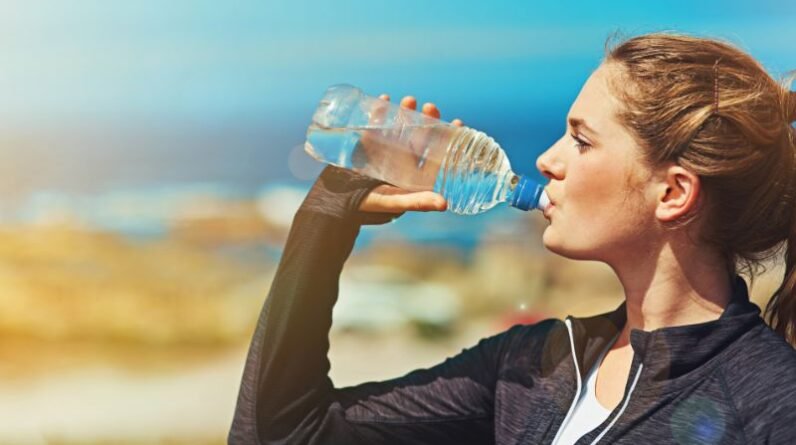
While many of us meticulously focus on nutrition and exercise for optimal health, we often overlook the simple act of drinking water, especially its pivotal role in women’s health. We’re all familiar with the general advice to stay hydrated, but the specific benefits for women, ranging from enhancing skin health to supporting reproductive functions, are less widely recognized.
By exploring how adequate hydration can mitigate UTI risks, bolster a healthy pregnancy, connect to mental health, and improve physical performance, we invite you to join us in uncovering the less discussed, yet crucial aspects of hydration for women’s well-being.
Why is water so essential, and how much do we really need?
Hydration and Skin Health
Adequate hydration plays an important role in maintaining skin health by ensuring it remains supple, elastic, and less prone to dryness and wrinkles. We’ve learned through research that water intake directly impacts our skin’s hydration levels, influencing its appearance and overall health.
Drinking sufficient amounts of water daily helps to flush out toxins that can clog pores, leading to a clearer complexion. Additionally, hydration supports the skin’s barrier function, protecting it from harmful environmental aggressors.
For those seeking to optimize skin health, we recommend prioritizing hydration as a foundational aspect of your skincare routine. This approach not only enhances skin quality but also supports its resilience against aging and external damage, underscoring the critical role hydration plays in achieving and maintaining a radiant complexion.
Impact on Reproductive Functions
Hydration’s role extends beyond skin health, greatly impacting women’s reproductive functions by supporting hormonal balance and aiding in the regulation of menstrual cycles. We’ve learned that essential water intake is vital for transporting hormones throughout the body, which plays a pivotal role in maintaining regular menstrual cycles and overall reproductive health.
Dehydration can lead to hormonal imbalances, potentially disrupting menstrual cycles and affecting fertility. Moreover, staying well-hydrated helps in the production of cervical mucus, essential for protecting and guiding sperm to the egg.
It’s clear that for women aiming to optimize their reproductive health, prioritizing hydration is a simple yet effective strategy. Ensuring consistent, sufficient water intake supports a healthy reproductive system, enhancing fertility and promoting a balanced hormonal environment.
Reducing UTI Risks
Among the myriad benefits of staying hydrated, reducing the risk of urinary tract infections (UTIs) stands out as a critical advantage for women’s health. Adequate fluid intake helps flush bacteria from the urinary tract, preventing the adherence and multiplication that lead to infections. Studies have consistently shown that women who maintain best hydration levels experience UTIs less frequently than those who do not.
It’s not just about drinking water; it’s about ensuring we’re consuming enough fluids throughout the day to support our urinary system’s natural defenses. We must also be mindful of the type of fluids we’re ingesting, prioritizing water and avoiding beverages that can irritate the bladder.
Embracing this approach can greatly decrease our risk of developing painful and recurrent UTIs.
Hydration for Healthy Pregnancy
Ensuring we stay well-hydrated during pregnancy is essential for both maternal and fetal health, supporting essential bodily functions and preventing complications. Proper hydration facilitates:
1. Efficient nutrient transport to the fetus.
2. Reduction in the risk of urinary tract infections, which are more common during pregnancy.
3. Maintenance of adequate amniotic fluid levels, essential for fetal development.
We must focus on consuming sufficient fluids, aiming for approximately 10 cups (2.3 liters) of fluids daily, as recommended by health experts. This includes water, milk, and fruit juices, though water should be the primary source of hydration.
Recognizing signs of dehydration, such as dark-colored urine, fatigue, and dizziness, is essential. We advise pregnant women to consult healthcare providers for personalized hydration strategies, ensuring both their health and the health of their baby.
Mental Health Connections
While focusing on the physical aspects of hydration is important, we shouldn’t overlook its significant impact on mental health and well-being. Adequate water intake is closely linked to reduced stress levels, improved mood, and enhanced cognitive function.
Studies show that even mild dehydration can impair concentration, increase feelings of anxiety, and lead to mood swings. By maintaining best hydration, we can support our brain’s ability to process information, manage emotions, and stay alert.
It’s essential for us to understand that water is a key component in the production of neurotransmitters, such as serotonin and dopamine, which regulate our mood. We advocate for prioritizing hydration as a simple, yet effective, strategy for promoting mental health alongside physical health.
Physical Performance Benefits
Hydration’s role in enhancing physical performance is both significant and well-documented, with studies showing that ideal water intake can boost stamina, strength, and recovery times. We’ve discovered that staying properly hydrated isn’t just about quenching thirst; it’s a critical component of maximizing our physical capabilities. Here’s how:
1. Enhanced Muscle Function: Proper hydration guarantees that our muscles work at their best, reducing the risk of cramps and strains.
2. Optimized Physical Response: Adequate water intake helps maintain our body’s cooling system, allowing for better endurance and performance in various environments.
3. Faster Recovery: Hydration accelerates the process of replenishing nutrients and removing toxins from our body, leading to quicker recovery after intense physical activity.
Mastering hydration practices guarantees we’re setting ourselves up for the best possible outcomes in our fitness and health endeavors.
Conclusion
To sum up, we’ve seen how essential hydration is for our overall well-being. From glowing skin to smooth reproductive processes, reducing UTI risks, supporting a healthy pregnancy, to enhancing our mental and physical performance, drinking enough water is akin to providing our bodies with a lifeline.
Let’s picture our bodies as gardens; without adequate water, nothing can flourish. So, let’s commit to keeping ourselves well-hydrated. After all, our health is our most precious asset, and hydration is a simple, yet powerful key.







